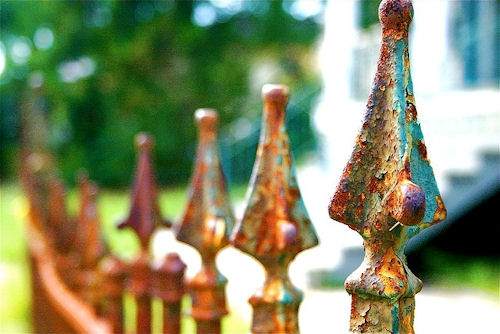 First thing in the morning Willie Murnion turns his welding rig onto our road and comes raising a rooster tail of dust fast down the gravel and bangs on the screen door with his ham of a fist and announces to my mother that he’ll go ahead and fix the basketball hoop.
First thing in the morning Willie Murnion turns his welding rig onto our road and comes raising a rooster tail of dust fast down the gravel and bangs on the screen door with his ham of a fist and announces to my mother that he’ll go ahead and fix the basketball hoop.
My mother, in her nightgown, nods and pulls the screen door closed. I pull on tennis shoes and deer-hide gloves and go out to help. While Willie readies the welder, I haul out his tools. I grab a big rusty box and small rusty box; I tote over a five-gallon bucket and fill it with well water. Willie lights a cigarette and rubs at his eyes, tells me the other welding helmet is in the cab, behind the seat. I hear it said around that Willie drinks too much, and I know Willie used sit on the stool next to my father at the Sportsman bar, which is most likely why Willie turned down our gravel road this morning: in his raging grief Willie came to do something for the wife and boy of the man he drank and laughed with, the man who listened late into the night. I crank open the truck door and see a pillow of greasy clothes on the seat, a cardboard suitcase, and a bottle of whiskey on the floor. I push the seat forward and grab the mask and consider that Willie has probably not been home for days, has not seen his wife and daughters—who go to our church and live just up the road from us in a double-wide trailer near the river—in a long, long time.
But I swallow this knowledge, look away from my frowning mother, who has come out to water her flowers, pale blue bathrobe tight around her waist. It was a week ago, my mother at work, that I took the pickup keys without permission and backed over the cement pad and up to the new hoop. I was thinking I could stand in the pickup bed and reach the screws to slip the hoop down the pole, then I could dunk, pretend to be some big NBA player. But I slammed the wedge of the tailgate right into the pole, and it cracked and buckled. My mother just seemed tired. She said as soon as I could pay for it, she’d call someone to fix it. I crunch across the gravel, set the welding masks together, and wait for Willie’s word.
Once Willie has the welder in order, and the puckered metal scraped and brushed, we put our shoulders to the pole and bend it straight. Willie gulps at the air, like some huge fish, his untucked shirt waving over the pearl curve of his stomach. He smells of smoke and ammonia. He wipes his sweating forehead on his sleeve and motions to the masks, and I hand him one, screw the other onto my head and flip the visor down. The day goes dark, until Willie sparks the torch. He lays, like I thought he would, a thick bead directly in the metal scar, but then, opposite that, where the pole looks more or less straight and fine, he wields a long rectangle of tempered steel, the width of it sticking six inches straight back.
I think a fin, a wing, maybe Willie’s signature or bit of artifice—but I’m so happy to have the evidence of my wrongdoing made right that I don’t ask any questions. I don’t discover that this steel wing is a kind of truss and carries the whole weight of the hoop, keeps it from slowly folding over on itself. Though I know some few things, I don’t understand all the forces at work here, the mechanics of tension, moment, and node.
How twice the strength is needed to come straight at something. How what is still is charged and what is hastened is dead. How bread becomes flesh, how flesh becomes dust, how the heart is bread and flesh and dust—the way with a rag Willie slops well water to cool the weld and picks up his clanking tools, and I thank him then, and shake his heavy, trembling hand, and though in a few years Willie will abandon his wife and daughters altogether and dedicate himself to liquor and other oblivions, I will think of him kindly and often.
—
Joe Wilkins is the author of a memoir-in-fragments, The Mountain, the Fathers (Counterpoint 2012) and a collection of poems, Killing the Murnion Dogs (Black Lawrence Press 2011). His poems, essays, and stories have appeared in the Georgia Review, the Southern Review, Harvard Review, the Sun, Orion, and Slate, among other magazines and literary journals. He lives with his wife, son, and daughter on the north Iowa prairie, where he teaches writing at Waldorf College.
Photo by Tory M. Taylor
